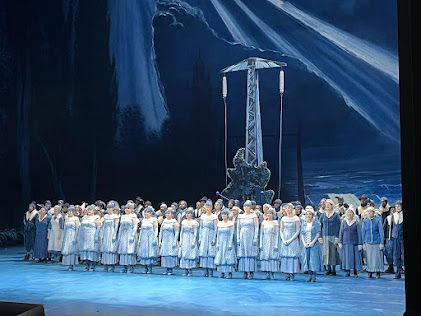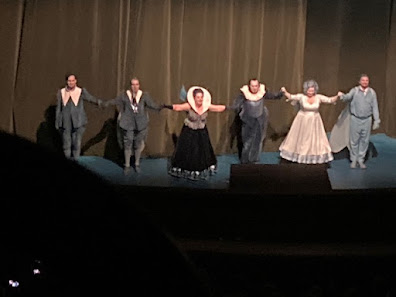(review in English below)
Este Lohengrin do Festival de Bayreuth, com encenação de Yuval Sharon, é muito bizarro, mas a encenação acaba por ser muito vistosa e agradável. A acção passa-se numa zona de postes eléctricos de alta tensão, todos os intervenientes principais vestem de azul, cor do cenário, o que se traduz num eleito visual muito agradável. A acção é intercalada por projecções de nuvens intensas. Quase todos têm asas de insectos. (Em Bayreuth, a última produção do Lohengrin era dominada por ratos; a actual é por insectos!). É uma comunidade sem líder que anseia por ele. Sempre que se fala no cisne (o irmão da Elsa e potencial líder) aparece a corrente eléctrica nos cabos.
O maestro Christian Thielemann foi excepcional na direcção da Orquestra que esteve ao mais alto nível. O Coro foi magnífico! Mais uma vez, ouviu-se Wagner em todo o seu esplendor.
Também superlativas foras as interpretações vocais. O tenor Klaus Florian Vogt foi um Lohengrin perfeito. Tem um timbre leve inconfundível, de uma beleza e musicalidade ímpares e neste papel é exímio. O In fernem land no 3º acto foi muito bonito e expressivo, apoiado de forma sublime pela orquestra. Acho que quando Wagner escreveu o Lohengrin, teve uma premonição que um dia surgiria um cantor ideal para ele – Klaus Florian Vogt!
A soprano Camilla Nylund foi uma Elsa von Brabant genuína e com boa interpretação vocal, muito emotiva e bem audível sobre a orquestra.
O rei Heinrich foi o baixo Georg Zeppenfeld que, mais uma vez, não deixou os seus créditos por mãos alheias e ofereceu-nos uma interpretação sólida, inteligente, com voz grave potente e bonita.
O barítono Martin Gantner foi o Friedrich von Telramund. Para mim o menos impressionante dos cantores, apesar de ter tido um bom desempenho.
Finalmente a Ortrud foi interpretada de forma eficiente e malvada pela mezzo Petra Lang, que tem uma voz imensa. A encenação também a favorece. As suas asas são diferentes das dos restantes, personificando um insecto malévolo. A intervenção vocal final foi arrepiante.
Terminado o espectáculo, o público explodiu em aplausos a todos, que foram obrigados a vir várias vezes ao palco. A maior ovação que ouvi em Bayreuth este ano.
(Texto escrito com contribuições do wagner_fanatic e do Fanático_Um, que assistiram a récitas em dias diferentes)
*****
LOHENGRIN, Bayreuth Festival, August 2022
This Lohengrin from the Bayreuth Festival, staged by Yuval Sharon, is very bizarre, but the staging turns out to be very showy and pleasant. The action takes place in an area of high voltage electric poles, all the main actors wear blue, the color of the scenery, which translates into a very pleasant visual choice. The action is interspersed with projections of intense clouds. Almost all have insect wings. (In Bayreuth, the last production of Lohengrin was dominated by rats; the current one is by insects!). It's a leaderless community that craves him. Whenever the swan (Elsa's brother and potential leader) is mentioned, the electrical current appears in the cables.
In the 3rd act, after the wedding, the bride and groom's room and their costumes are in a warmer color, reddish orange (greater security in the marriage, love and protection by Lohengrin), contrasting with the blue of the rest of the scenography. But after this scene, all returns to the usual blue environment (except for Elsa) and that's how everything goes until it's over. In the end, Ortrud, with Telramund's companions, bound everyone with a rope and she threw fire on the bonfire logs, a revenge in the face of the known defeat of the evil duo of the opera. Elsa's brother appears in green with a small tree trunk in his hand, symbolizing the green of hope, of renewal, of rebirth, of a new reality. And maybe that's why everyone has to die in the end. All die except Elsa and her brother, symbolizing this renewal (and the Good) and except Ortrud, leaving the idea that the Evil is and will always be present in Life.
Conductor Christian Thielemann was exceptional in the direction of the Orchestra that was at the highest level. The Choir was magnificent! Once again, Wagner was heard in all his splendor.
Also superlative were the vocal interpretations. Tenor Klaus Florian Vogt was a perfect Lohengrin. He has an unmistakable light timbre, of unparalleled beauty and musicality, and in this role he excels. In fernem land in the 3rd act was very beautiful and expressive, supported in a sublime way by the orchestra. I think that when Wagner wrote Lohengrin, he had a premonition that one day an ideal singer would appear for him – Klaus Florian Vogt!
Soprano Camilla Nylund was a genuine Elsa von Brabant with a good vocal interpretation, very emotional and very audible over the orchestra.
King Heinrich was bass Georg Zeppenfeld who, once again, did not leave his credits in the hands of others and offered us a solid, intelligent interpretation, with a powerful and beautiful bass voice.
Baritone Martin Gantner was Friedrich von Telramund. For me the least impressive of the singers, despite having a good performance.
Finally, Ortrud was played efficiently and evilly by mezzo Petra Lang, who has a huge voice. The staging also favors her. Her wings are different from the rest, personifying a malevolent insect. Her final vocal intervention was chilling.
At the end of the performance the audience burst into applause to all, who were forced to come to the stage several times. This was the biggest ovation I've heard in Bayreuth this year.
*****
























Sem comentários:
Enviar um comentário